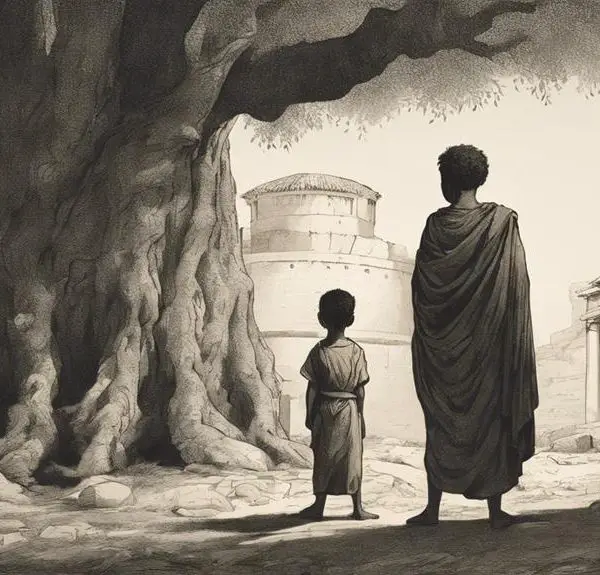Uncover the tales of dishonor in the Bible, revealing the profound lessons on human nature and the path to redemption that awaits.

Dishonor in the Bible
As the saying goes, 'A good name is better than fine perfume,' and nowhere is this truer than in the biblical narratives that weave tales of honor and dishonor through the ages. You'll find that the Bible doesn't shy away from depicting the raw consequences of dishonorable actions, nor does it leave its characters without a path to redemption.
From the deceit of Jacob to the denial of Peter, these stories offer more than just moral lessons; they invite you to reflect on the complexity of human nature and the possibility of forgiveness. Let's explore how these ancient narratives still resonate with the challenges you face today, hinting at timeless wisdom that remains relevant.
Key Takeaways
- Dishonor in biblical texts reflects societal norms and impacts individuals, families, and communities.
- Biblical stories of dishonor serve as lessons on social, familial, and personal ethics.
- Consequences of dishonorable actions include loss of trust, respect, and societal standing.
- Redemption is possible through repentance, rituals, and commitment to moral renewal.
The Concept of Dishonor

In analyzing the concept of dishonor within biblical texts, it's essential to recognize its multifaceted implications on both individual and communal levels. Dishonor, as presented in these ancient narratives, isn't merely a personal failing or moral lapse; it's deeply entrenched in the cultural context and honor codes of the times. You'll find that these honor codes weren't uniform but varied widely among different communities and periods, influencing how actions were interpreted and judged.
Understanding dishonor requires delving into the societal norms and values that shaped these biblical societies. Honor and dishonor functioned as pivotal social mechanisms, guiding behavior, and establishing social hierarchies. Actions deemed dishonorable could lead to severe consequences, not just for the individual but for their entire family or community, underscoring the collective aspect of honor.
Moreover, the cultural context provided a lens through which actions were evaluated. What constituted dishonor in one society could be perceived differently in another, highlighting the relative nature of these concepts. This variability underscores the importance of considering historical and cultural backgrounds when interpreting the notion of dishonor in biblical texts, ensuring a more nuanced and accurate understanding.
Biblical Figures and Dishonor
Numerous biblical figures experience dishonor, shedding light on how these narratives convey complex moral and social lessons. The exploration of dishonor among these figures not only reflects the personal failings or challenges they encounter but also serves as a mirror to the society's values and ethical standards at the time. Analyzing these stories, you're exposed to the multifaceted nature of dishonor, including genealogical shame and cultural dishonor, which resonate through the ages.
- Genealogical Shame: Biblical narratives often highlight the repercussions of individual actions on familial lines, illustrating how personal dishonor can tarnish a family's reputation for generations. This aspect emphasizes the collective nature of honor and shame in ancient societies.
- Cultural Dishonor: The stories of certain biblical figures reveal how they deviated from societal norms, leading to their marginalization. These accounts provide insights into the cultural values and the boundaries of acceptable behavior, showcasing how cultural dishonor is navigated and negotiated.
- Personal Failings: Through the lens of biblical characters, the scripture delves into personal weaknesses and moral failings, portraying how these lead to dishonor. This exploration encourages reflection on the human condition and the potential for redemption.
These dimensions of dishonor serve as critical tools for understanding the intricate web of social, familial, and personal ethics in biblical times.
Consequences of Dishonorable Actions

ARTICLE TITLE: Dishonor in the Bible
PREVIOUS SUBTOPIC: 'Biblical Figures and Dishonor'
CURRENT SUBTOPIC: 'Consequences of Dishonorable Actions'
Exploring the consequences of dishonorable actions within biblical narratives reveals the profound impact these deeds have on individuals, their families, and wider society. The scriptures detail various instances where dishonorable actions lead to significant repercussions, underlining the importance of integrity and righteousness.
Individual Consequences |
Family Impacts |
Societal Reactions |
|---|---|---|
Loss of trust and respect |
Strained family relations |
Increased social discord |
Divine punishment |
Generational curses |
Loss of societal standing |
Personal guilt and shame |
Inheritance disputes |
Collective judgment |
These outcomes emphasize the heavy toll that dishonorable actions can exact, not just on the perpetrators but also on their immediate circles and communities at large. Family impacts often manifest as deep-seated conflicts and broken relationships, highlighting the interconnectedness of personal actions and familial wellbeing. Societal reactions further demonstrate the ripple effect of dishonor, affecting social cohesion and harmony.
Analyzing these consequences in a biblical context offers valuable insights into the importance of maintaining honor and integrity, underscoring the far-reaching implications of our actions on family dynamics and societal structures.
Paths to Redemption
Despite the gravity of dishonorable actions, the Bible also illuminates pathways to redemption, emphasizing the transformative power of repentance and forgiveness. The scriptures outline a framework for individuals to transition from a state of dishonor to one of restored dignity and moral renewal. This journey isn't merely about seeking forgiveness from those wronged but also involves a profound internal transformation and a commitment to a righteous path.
Paths to achieve redemption include:
- Engagement in Redemption Rituals: The Bible details various rituals that serve as outward expressions of an inward change. These rituals, ranging from sacrifices to ceremonial cleansings, symbolize the individual's earnest desire to return to a state of purity and honor.
- Genuine Repentance: A pivotal element in the process of redemption is the genuine acknowledgment of wrongdoing and the heartfelt remorse for actions taken. This repentance isn't a superficial gesture but a deep, personal reckoning with one's actions and their impact on others.
- Commitment to Moral Renewal: Redemption isn't seen as complete without a sincere commitment to change one's ways. This involves adopting new behaviors that align with ethical and moral guidelines provided in the scriptures, demonstrating a tangible shift in character and conduct.
The biblical narrative emphasizes that, regardless of the depth of one's dishonor, the gates of redemption remain open to those who earnestly seek it through repentance, redemption rituals, and a commitment to moral renewal.
Lessons for Today's World

In today's complex society, the biblical principles of repentance, forgiveness, and moral renewal offer invaluable insights for addressing dishonor and facilitating personal and collective growth. These ancient texts, rich in narratives and teachings, provide a framework for understanding how individuals and communities can move beyond transgressions through meaningful actions and transformative attitudes. The societal impacts of applying these principles are profound, fostering an environment where understanding and compassion can flourish, counteracting the cycles of blame and retribution that often dominate contemporary discourse.
Cultural interpretations of dishonor, deeply embedded in historical and religious contexts, vary significantly across different societies. Yet, the core messages of accountability, reconciliation, and redemption found in the Bible transcend cultural boundaries, offering a universal path towards healing and integrity. By examining these teachings through a scholarly lens, you gain insights into their relevance and applicability in addressing today's moral dilemmas and interpersonal conflicts.
Incorporating these ancient wisdoms into modern practices encourages a reflective and ethical approach to life's challenges, highlighting the timeless nature of these biblical lessons. As you navigate the complexities of modern existence, these principles serve as a moral compass, guiding actions and decisions towards a more honorable and just society.
Frequently Asked Questions
How Do Different Translations of the Bible Address the Concept of Dishonor, and Do These Variations Affect Its Interpretation?
Different translations of the Bible address the concept of dishonor with varying degrees of translation accuracy, reflecting linguistic evolution over time. These variations can significantly affect its interpretation, leading to diverse understandings among readers.
You'll find that linguistic nuances and cultural contexts play crucial roles in how dishonor is conveyed, making it essential to consider the translation's fidelity to original texts when analyzing this concept.
In What Ways Do Cultural Contexts Outside of the Bible Influence Our Understanding of Dishonor in Biblical Times?
Navigating the murky waters of understanding dishonor without its biblical backdrop, you're met with the slippery slope of cultural misinterpretation and historical anachronism. It's akin to trying to read a map in the dark; without the light of context, interpretations can easily stray.
You're piecing together a puzzle where pieces from different boxes – modern biases and ancient norms – don't quite fit. This mismatch skews your view, making it a challenging endeavor to grasp the true essence of dishonor.
Are There Any Psychological Studies or Theories That Help Explain Why Dishonorable Actions Were Perceived and Dealt With in the Ways Described in the Bible?
You're exploring how psychological frameworks like cognitive dissonance and moral foundations theory might illuminate the handling of dishonorable actions.
Cognitive dissonance, the mental discomfort experienced when holding two conflicting beliefs, could explain the internal struggles faced.
Moral foundations theory, identifying the basis of ethical behavior, provides insight into why certain actions were deemed dishonorable.
Both theories offer a deeper understanding of the psychological underpinnings influencing behaviors and societal norms.
How Have Perceptions of What Constitutes Dishonor in the Bible Changed Over Time, Especially in Modern Society?
Imagine navigating a complex maze; that's akin to understanding how perceptions of dishonor have evolved. Modern interpretations often diverge from biblical descriptions, reflecting a shift in societal values and norms.
Scholars meticulously analyze historical accuracy, debating the relevance and interpretation of ancient texts in today's context. You're witnessing an ongoing dialogue where past and present converge, challenging us to reconsider what we've long deemed dishonorable.
Can the Concept of Dishonor in the Bible Be Reconciled With Contemporary Views on Human Rights and Equality?
You're navigating the complex terrain of reconciling traditional concepts with modern values, particularly in terms of human rights and equality.
The equality paradox and human rights evolution challenge you to re-examine and potentially reconcile these age-old notions with contemporary viewpoints.
Analyzing this through a scholarly lens, you must critically assess how these ancient principles can align with or diverge from today's standards on human rights and equality, fostering a nuanced understanding.
Conclusion
In sum, the Bible intricately weaves tales of dishonor with moral lessons, urging you to reflect on the consequences of your actions. Figures like Judas and David highlight the spectrum of dishonor, from betrayal to redemption.
Isn't it remarkable how these ancient narratives still resonate, offering a mirror to our own lives? By examining these stories, you're prompted to navigate your path with integrity, underscoring the timeless relevance of these lessons in today's morally complex world.



Sign up